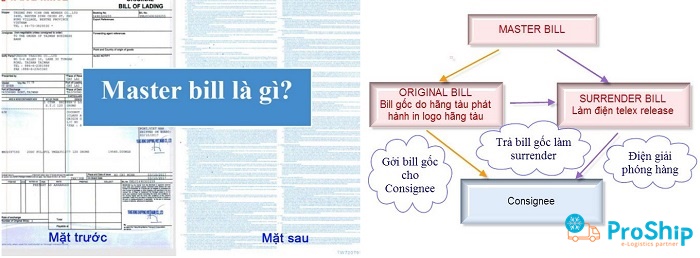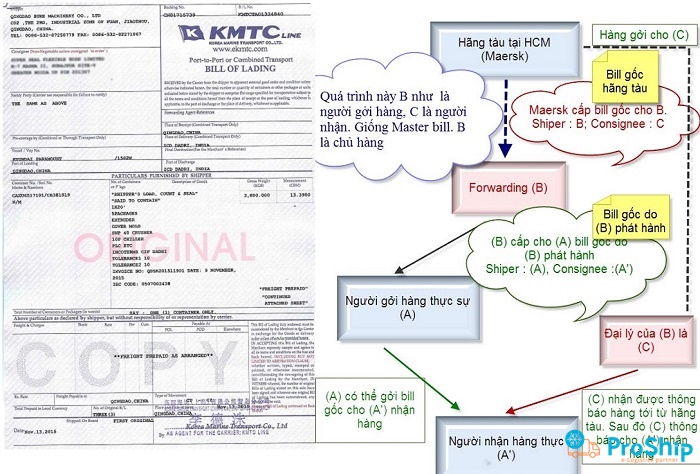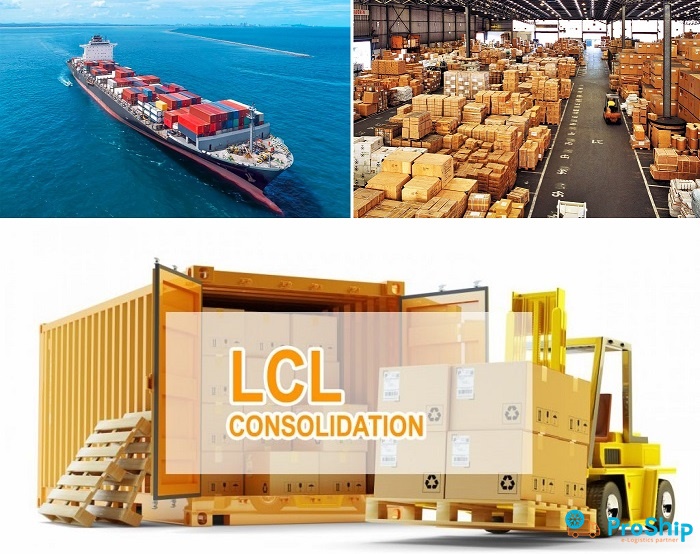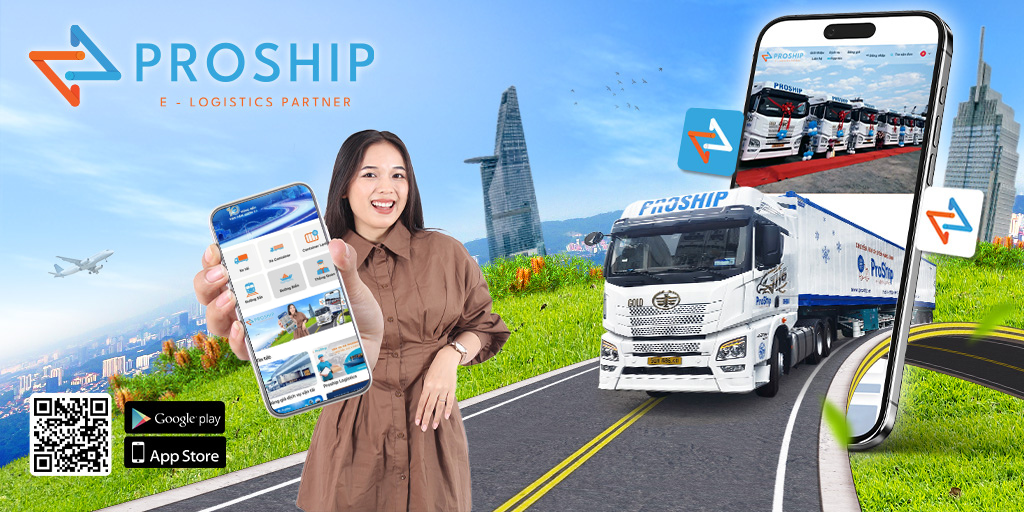x Bạn đang hoạt động trong lĩnh vực XNK cần biết vận đơn Master Bill là gì?
x Bạn muốn biết tầm quan trọng của Master Bill of Lading trong vận tải biển?
x Bạn cần gửi hàng đường biển nên muốn tìm Đơn vị Forwarder uy tín, chuyên nghiệp?
Trước hết bạn cần hiểu rằng, Master Bill of Lading (MBL) là chứng từ vận tải do người chuyên chở (Hãng tàu) phát hành khi nhận được hàng từ Người gửi hàng (Shipper). Để giúp bạn có cái nhìn chuẩn xác và bổ sung kiến thức căn bản về Vận đơn sơ cấp Master Bill, Proship.vn sẽ update những nội dung liên quan tới MBL, chỉ ra tầm quan trọng của Master Bill trong vận tải đường biển. Thêm nữa, nếu bạn quan tâm tới Dịch vụ XNK hàng lẻ Chính Ngạch đi các nước giá rẻ nên cân nhắc tin chọn chúng tôi.
📦 Hotline Liên Hệ Vận Chuyển
🧭 Miền Trung
Master Bill of Lading là gì?
Có thể nói, bộ vận đơn vận chuyển đường biển là chứng từ quan trọng nhất trong bộ chứng từ hàng hóa vì các chức năng chính yếu của nó. Có rất nhiều loại vận đơn được phân loại dựa theo các tiêu chí khách nhau nhưng xét về mặt người phát hành sẽ có 2 loại là Vận đơn sơ cấp hay còn gọi là Master B/L (MBL) và Vận đơn thứ cấp hay còn gọi là House B/L (HBL). Vậy, Master Bill là gì?
Vận đơn chủ (Master B/L – Master Bill of Lading) là những loại vận đơn chủ do người sở hữu phương tiện vận chuyển (như hãng tàu, hãng máy bay) cấp cho người đứng tên trên bill với tư cách là những chủ hàng (Shipper). Hình thức nhận diện Vận đơn chủ (Master B/L – Master Bill of Lading) là trên vận đơn có thông tin hãng tàu như Logo, tên Công ty, số điện thoại, văn phòng hãng tàu…Và một vận đơn do Forwarder hoặc NVOCC phát hành được gọi là House Bill of Lading. Để phát hành Master B/L, chúng ta gửi hướng dẫn về thông tin hàng hóa sẽ xếp lên tàu và số lượng bản sao cần cấp cho hãng tàu. Đó là những luồng thông tin cần thiết để hãng tàu chuẩn bị và phát hành MBL.

Trước khi phát hành MBL, hãng tàu yêu cầu cung cấp một số tài liệu chứa thông tin lô hàng. Chứng từ chính là S/I (Shipping Instruction) và B/L Instruction (Dock Receipt). Dock Receipt là biên nhận cấp cho hàng được nhận hoặc được giao tại cầu cảng hoặc bến tàu. Khi tiến hành giao một lô hàng nước ngoài, biên nhận bến cảng được phát hành khi vận đơn nộp lại cho hãng vận chuyển.
Các thông tin cần thiết cho một B/L được chuyển đến hãng tàu theo trình tự sau: S/I => B/L Instruction => Master B/L. Đầu tiên, nguồn thông tin chính cần thiết tạo nên Master B/L là S/I, sau đó, thông tin trong S/I được thể hiện trong B/L Instruction. Cuối cùng, Master B/L được tạo dựa trên thông tin của B/L Instruction. Trên vận đơn, các bên được đứng tên trên Master Bill gồm:
Forwarder nước xuất khẩu => Hãng tàu => Forwarder nước nhập khẩu.
Tầm quan trọng của Master Bill như thế nào?
Khi đã biết chính xác Master Bill là gì thì việc tìm hiểu thêm về lý do phát sinh, nội dung cơ bản cũng như tầm quan trọng của vận đơn Master Bill of Lading trong vận tải đường biển thực sự rất cần thiết. Proship mời bạn cập nhật thông tin bên dưới:
Lý do phát sinh Master Bill khi vận chuyển hàng đường biển
Khi thực hiện nghiệp vụ vận tải quốc tế qua đường biển, thông thường người mua và người bán có thể sử dụng 2 cách để đặt booking cho hàng hóa xuất khẩu. Đó là:
- Booking trực tiếp với hãng tàu: Tức là bạn sẽ trực tiếp liên hệ booking tàu, tiến hành chi trả mọi loại phí cho hãng tàu như phí Local Charge, cước vận tải,…
- Booking qua Forwarder (Công ty giao nhận): Tức là bạn chỉ cần chi trả các khoản phí cho Forwarder, còn họ sẽ tiến hành booking tàu, trả lại khoản phí bạn đã nộp cho hãng tàu. Tuy nhiên, Forwarder sẽ giữ lại một khoản tiền được xem như lợi nhuận khi họ thực hiện việc làm trung gian booking cho bạn.
Có thể thấy, chủ hàng hoặc Forwarder đều có thể thực hiện việc booking với hãng tàu. Do đó, trên vận đơn do hãng vận tải cấp có thể xảy ra 2 trường hợp với người đứng tên trong ô Shipper và Consignee:
- Trường hợp 1: Shipper là người xuất khẩu thực tế hàng hóa (Real shipper) và Consignee là người nhập khẩu thực tế hàng hóa (Real consignee). Đối với trường hợp này, hãng tàu sẽ phát hành MBL và không phát sinh House Bill. Lô hàng chỉ có một bộ Bill duy nhất do hãng vận tải cấp.
- Trường hợp 2: Shipper là Công ty trung gian thực hiện booking giúp chủ hàng thực tế (Forwarder) và Consignee là đại lý của Forwarder tại cảng đến (Forwarding Agent). Ở trường hợp này, lô hàng có đến 2 bộ vận đơn là House Bill (HBL) và Master Bill (MBL). Cụ thể, MBL do hãng tàu cấp cho Forwarder còn HBL do Forwarder cấp cho người gửi hàng thực tế.

Nội dung cơ bản trên Master Bill of Lading (MBL)
- Thông tin của người gửi hàng xuất khẩu, có thể là Real Shipper hoặc Forwarder;
- Thông tin của người nhận hàng xuất khẩu, có thể là Real Consignee hoặc đại lý Forwarder (Forwarder Agent);
- Tên của tàu vận chuyển, điểm khởi hành và điểm đến;
- Thông tin về hàng hóa vận chuyển như tên hàng, số lượng, khối lượng, số hiệu, ngày hàng được xếp lên tàu,…;
- Các điều khoản quy định chi tiết quyền và trách nhiệm giữa các bên. Đây sẽ là căn cứ pháp lý để xử lý những tình huống xảy ra tranh chấp;
- Thời hiệu khiếu nại cho MBL 1 năm;
- Các điều khoản thanh toán;
- Trên MBL sẽ có logo hãng tàu, tên hãng tàu, số điện thoại, văn phòng của hãng tàu;
- MBL có dẫn chiếu một số công ước quốc tế phổ biến như Hague Rules, Hague Visby Rules hoặc Hamburge Rules.
📦 Hotline Liên Hệ Vận Chuyển
🧭 Miền Trung
Phân biệt sự khác nhau giữa House Bill và Master Bill
House Bill và Master Bill Đều là 2 vận đơn đường biển phổ biến hiện nay nên có không ít người nhầm lẫn. Tuy nhiên, thực tế đây là 2 loại vận đơn hoàn toàn khác nhau và tất nhiên chúng không thể thay thế được cho nhau. House Bill viết tắt là HBL hay HB/L, là vận đơn thứ cấp do Công ty Forwarder phát hành cho Shipper (người gửi hàng) và Consignee (người nhận hàng) đối với trường hợp Shipper không yêu cầu Bill gốc từ phía hãng tàu. Cách nhận biết House bill rất dễ dàng. Theo đó trên vận đơn sẽ có logo, tên Công ty, số điện thoại, văn phòng của Công ty Forwarder. Dưới đây là một số sự khác nhau giữa House bill và Master Bill mà Proship muốn chia sẻ tới bạn đọc:
|
Master Bill |
House bill |
|
|
Đối tượng phát hành |
Người gửi hàng thực tế hoặc Công ty Forwarder |
Người gửi hàng thực tế |
|
Rủi ro |
Có rủi ro nhưng tỷ lệ tổn thất thấp hơn bởi vì hãng tàu thường là đơn vị lớn, có uy tín trong ngành. Trong trường hợp gặp phải rủi ro thì người gửi hàng có thể kiện trực tiếp hãng tàu để đòi quyền lợi do có bill gốc. |
Mức rủi ro cao hơn. Và mức rủi ro này tùy thuộc vào trách nhiệm của Công ty Forwarder. |
|
Sửa lỗi |
Khó chỉnh sửa lỗi |
Dễ chỉnh sửa lỗi |
|
Quy tắc áp dụng |
Chịu tác động của quy tắc Hague, Hamburg,… |
Không chịu tác động của bất kỳ quy tắc nào |
|
Nơi nhận hàng |
Cảng đến (Port) |
Thường sẽ là kho bãi của Công ty Forwarder |
|
Hình thức |
Logo, tên Công ty, Số điện thoại, văn phòng của Công ty hãng tàu |
Logo, tên Công ty, Số điện thoại, Văn phòng Công ty Forwarder |
* Ví dụ: Người gửi hàng A (Shipper), gửi hàng cho người nhận là B (Consignee) nhưng chủ hàng booking tàu qua bên trung gian là Công ty Forwarder C vận chuyển đến cảng Incheon (Hàn Quốc) đi hãng tàu OOCL. Công ty Forwarder C có đại lý Forwarding Agent D tại cảng Incheon. Cụ thể:
Làm Master Bill: Người xuất khẩu hàng thực tế (Real Shipper A) sẽ thỏa thuận với Công ty Forwarder C book tàu đi Incheon và yêu cầu lấy Bill gốc do hãng tàu phát hành. Trên Bill ghi rõ, người gửi (Shipper) là A và người nhận (Consignee) là B (người nhận hàng thực tế). Khi hàng đến Incheon, hãng tàu OOCL sẽ gửi thông báo hàng đến D/O cho người nhận B ra nhận hàng. Như vậy có thể thấy trên vận đơn Công ty Forwarder C không xuất hiện và họ chỉ thay mặt Shipper A book tàu.
Làm House Bill: Shipper A thỏa thuận với Công ty Forwarder B book tàu đi Incheon và B book tàu qua hãng tàu OOCL. Khi book tàu, OOCL sẽ cấp cho Công ty Forwarder B một Bill gốc (MBL) ghi tên người gửi (Shipper) là B và người nhận là đại lý Forwarding Agent D tại cảng đến. Tiếp đó, Công ty Forwarder B sẽ phát hành Bill gốc House Bill (HBL) theo form của họ và ghi trên vận đơn Shipper là người A, Consignee là người B. Khi hàng đến nơi, đại lý Forwarding Agent D sẽ thông báo cho người nhận B đến nhận hàng.
=> Như vậy có thể thấy, MBL do hãng tàu OOCL cấp còn House Bill do Công ty Forwarder C cấp.
>>Xem thêm: Local Charges là gì?
PROSHIP.VN có phải là Đơn vị Forwarder cung cấp Dịch vụ xuất nhập khẩu hàng lẻ Chính Ngạch tốt nhất?
Trong các giao dịch mua bán hàng hóa Quốc tế, vận chuyển Quốc tế là yếu tố không thể thiếu và vô cùng quan trọng. Nếu chọn đúng phương thức vận chuyển thì các Công ty logistics sẽ tiết kiệm được chi phí, tối đa hóa lợi nhuận và giảm thiểu rủi ro trong quá trình giao hàng. Công ty Cổ Phần Proship tự tin là một trong những địa chỉ uy tín, an toàn, chất lượng mà quý khách hoàn toàn có cơ sở tin tưởng lựa chọn gửi hàng lẻ, hàng ghép, hàng nguyên container tại đây. Chúng tôi nắm rõ, hiểu rõ Master Bill là gì cùng các vận đơn, chứng từ liên quan. Chúng tôi cung cấp Dịch vụ xuất nhập khẩu hàng lẻ Chính Ngạch từ Cảng Việt Nam đến các cảng khu vực Châu Á, Châu Úc, Châu Âu, Hoa Kỳ (và ngược lại).

Nhất là luôn Book được tàu kể cả mùa cao điểm, mang lại sự hài lòng cho quý khách. Cách thức triển khai Dịch vụ Gom hàng lẻ, hàng LCL/Gom hàng rời/Gom hàng consol từ Việt Nam đi các nước (và ngược lại) mà Proship đã và đang thực hiện vận chuyển hàng hóa khi chủ hàng không đủ hàng để đóng nguyên một container mà cần ghép chung với một số lô của chủ hàng khác. Khi đó, chúng tôi sẽ kết hợp nhiều lô hàng lẻ (LCL shipments), sắp xếp, phân loại và đóng chung vào container, sau đó thu xếp vận chuyển từ cảng xếp tới cảng đích.
Lợi ích khi chọn Dịch vụ vận chuyển hàng LCL
- Tiết kiệm chi phí lưu kho: Việc để hàng hóa trong kho và chờ đợi đến khi gom hàng đủ một container sẽ làm phát sinh chi phí lưu kho. Sử dụng Dịch vụ vận chuyển hàng lẻ LCL để vận chuyển hàng hóa ngay sẽ giúp chủ hàng tiết kiệm được chi phí lưu kho;
- Tiết kiệm chi phí vận chuyển: Chủ hàng chỉ cần trả cước phí cho không gian mà họ sử dụng;
- Tiết kiệm thời gian: Nhờ có Dịch vụ vận chuyển hàng lẻ (LCL), chủ hàng không cần phải chờ đợi cho đến khi có đủ số lượng hàng đóng đầy container mới tiến hành vận chuyển. Chủ hàng có thể sử dụng dịch vụ gom hàng đường biển LCL đóng ghép với các chủ hàng khác để đóng đầy một container nhanh chóng.
Các dịch vụ cung cấp tại đây
- Cung cấp cước vận chuyển từ cảng TPHCM, Đà Nẵng, Quy Nhơn,…đến cảng các nước Nhật, Đức, Úc, Mỹ,…(CY-CY);
- Dịch vụ vận chuyển hàng FCL/LCL;
- Cung cấp dịch vụ Door to Door, CY – Door, Door to CY, Ex-work, DDU, DD,…;
- Cung cấp dịch vụ vận chuyển đường bộ;
- Cung cấp dịch vụ khai báo hải quan;
- Cung cấp dịch vụ hun trùng;
- Cung cấp dịch vụ làm giấy chứng nhận nguồn gốc xuất xứ;
- Cung cấp dịch vụ làm giấy kiểm dịch thực vật,…
Các hãng tàu biển đã, đang và sẽ là đối tác chiến lược của Proship
APL, BENLINE, MA-CGM, CNC, COSCO, HIPPING, ECU LINE, EVERGREEN, EMADEPT, GRAND, HANJIN, HAPAG-LLOYD, HEUNG-A, HUBLINE, HYUNDA, NDOTRA, K-LINE, KMG, KMTC, AERSK LIN, MCC, MELL, MOL, MSC, AMSUNG, NORTH, FREIRHT, NYK, OOCL, ORIENTAL, ORIMAS, PIL, RCL, SINOKOR, INOTRANS, SITC, TS LINE, VOSA, VVMV, WANHAI, NG MIN, ZIM,…là các hãng tàu biển uy tín, danh tiếng Quốc tế chúng tôi đã, đang và sẽ cố gắng kết nối để nâng tầm dịch vụ hơn nữa ở hiện tại và tương lai.
Với Dịch vụ xuất nhập khẩu hàng lẻ LCL từ Việt Nam đi các nước, Proship sẽ đảm nhận
- Đối với hàng xuất TPHCM – Mỹ, Đức, Úc, Nhật,…: Chúng tôi vận chuyển giao Door Door – Lấy tận xưởng tại Việt Nam và giao tận tay người nhận và ngược lại gồm toàn bộ chi phí đường biển…
- Đối với hàng nhập từ cảng các nước – TPHCM (Cát Lái): Chúng tôi sẽ thu xếp việc liên hệ shipper để kiểm tra thông tin hàng hóa ngày dự kiến giao hàng để thu xếp lịch tàu phù hợp, và book chuyến tàu sớm nhất vận chuyển về Việt Nam giao cho khách.
* ĐẶC BIỆT, chúng tôi có thuê kho CFS tại Cảng Cát Lái được quản lý bằng hệ thống Camera giám sát 24/24 đảm bảo tính an toàn cao nhất cho hàng hóa. Quá trình hoạt động trong Ngành hàng hải, Vận tải biển, Công ty đã dần chứng tỏ năng lực vận tải và sự uy tín của mình trên thị trường (kể cả đi hàng FCL hay LCL).
Proship đã góp nhặt thông tin cần thiết để giúp bạn biết được Master Bill là gì, tầm quan trọng của Master Bill of Lading cũng như sự khác nhau cơ bản giữa House Bill với Master Bill,…Bạn quan tâm tới những kiến thức về vận đơn sơ cấp MBL nên lưu lại bài chia sẻ này, tin chắc sẽ hỗ trợ phần nào cho công việc xuất nhập khẩu hàng hóa đường biển của nhiều Cá nhân/Doanh nghiệp. Khi có nhu cầu ghép hàng với nhiều khách lẻ để tiết kiệm chi phí, thời giờ lẫn công sức, liên hệ ngay với chúng tôi theo số 0909 344 247. Đội ngũ nhân viên Sales chuyên trách từng mảng kinh doanh Dịch vụ vận tải – chuyển gửi hàng hóa Nội địa/Quốc tế sẽ tư vấn và báo giá đến bạn.
📦 Hotline Liên Hệ Vận Chuyển
🧭 Miền Trung

